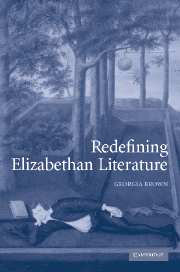Chapter 3 - Literature as fetish
Published online by Cambridge University Press: 22 September 2009
Summary
THE EPYLLION AND THE EROTICIZATION OF ELIZABETHAN LITERARY CULTURE
One of the embarrassing truths about the literary culture of the 1590s is that it is obsessed with sex. This is not only a matter of explicit content and the liberal use of innuendo: the eroticization of literary culture is also expressed in the way the most fundamental aspects of literary activity are reconceived. For example, as the previous chapter argued, in the account of the rape of Heraclide in The Unfortunate Traveller, reading is represented as voyeuristic sexual aggression, in “The Choice of Valentines,” the pen is elided with the penis, and in Have With You to Saffron Walden, a literary career is both a kind of prostitution and a form of pimping, at least in the case of Gabriel Harvey. The eroticization of literature is widespread and insidious in the 1590s, and its disruptive energy surfaces in texts such as contemporary lampoons of Elizabeth, Donne's “Elegies” and The Rape of Lucrece, but there is one genre which reached the peak of its popularity in the decade, in which eros is exploited and explored with self-conscious abandon, and that genre is the epyllion.
This chapter explores how the pursuit of shame in erotic literature defines a new aesthetic ideology, and how that ideology interacts with understandings of sexuality and gender. The chapter is based on a reading of eleven epyllia, ranging from Scillaes Metamorphosis, published in 1589, to Faunus and Melliflora, published in 1600.
- Type
- Chapter
- Information
- Redefining Elizabethan Literature , pp. 102 - 177Publisher: Cambridge University PressPrint publication year: 2004



